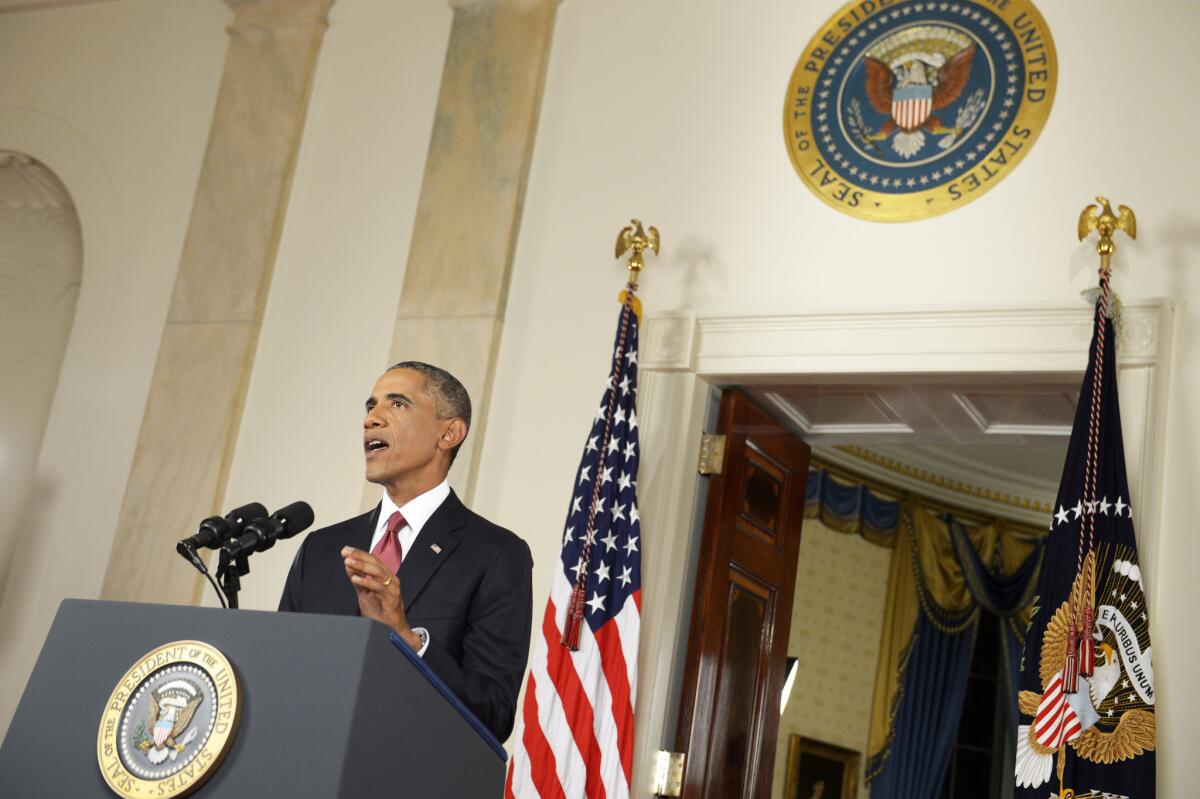Middle East’s deep divisions reflected in reactions to Obama speech

- Share via
Reporting from Beirut — Reaction to President Obama’s vow to “destroy” the Islamic State militant group was predictably mixed throughout the Middle East and elsewhere on Thursday, with commentators and media outlets reflecting deeply divided opinions about U.S. actions in the region.
In Baghdad, the office of Prime Minister Haider Abadi released a statement welcoming the U.S. stance as “supporting Iraq against Daesh and all terrorist groups,” using the common Arabic name for the Islamic State, formerly known as the Islamic State of Iraq and Syria, or ISIS.
Leaders in the generally pro-U.S. Kurdish region in northern Iraq also were positive about the White House moves to eliminate the militant group, which now controls a broad swath of territory across Iraq and neighboring Syria.
“We welcome this new strategy,” Hoshyar Zebari, a Kurd who was named as one of Iraq’s deputy prime ministers, told the Associated Press. “There is an urgent need for action. People cannot sit on the fence.”
Some Iraqi media outlets, however, were less enthusiastic about the participation in the coaliton of nations they considered to be secretly sponsoring the Islamic State.
Ahmad Kathem, a columnist for the Iraqi daily Sawt Al-Iraq, blamed Saudi Arabia, Jordan, Turkey and other Persian Gulf states for supporting the Islamist militants. He described the campaign against the group as a “play to trick people and absolve of responsibility those who benefited from ISIS,” concluding that Obama was “in collusion” with Saudi Arabia and its conservative Wahhabi Muslims.
The U.S.-backed Syrian opposition also applauded the White House’s decision to expand training for rebels and to consider airstrikes in Syria against positions held by Islamist militants. But opposition groups allied with the Western-backed Free Syrian Army called for direct action as well against the forces of Syrian President Bashar Assad.
“We ... welcome the commitment to intensify the train and equip program to enable the Free Syrian Army to eradicate ISIS and other forms of terror in Syria, including the Assad regime,” said Hadi Bahra, president of the Syrian National Coalition, an opposition umbrella group.
In his speech Wednesday, Obama did not mention any plans for direct attacks against the forces of the Assad government. The president ruled out any cooperation with the government in Damascus, which is also fighting the Islamic State and other militant groups on the ground in Syria.
The Syrian government has warned that any U.S. airstrikes inside Syria without the consent of Damascus would be considered an act of aggression. Syria has a sophisticated anti-aircraft defense system, mostly from the Soviet era, though some installations have been destroyed in the more than three year civil war. Pro-government analysts in Syria have raised questions about the U.S. motivations.
“What guarantees the United States and its allies will not target Syrian sites and enter through the window to invade lands in Syria and pressure Damascus to make it submit?” asked columnist Naim Ibrahim in the pro-government Al Watan newspaper in Damascus.
Russia, Syria’s close ally, warned Thursday against U.S. airstrikes against targets in Syria. Such attacks without the consent of the Syrian government or a United Nations Security Council resolution “would be an act of aggression, a gross violation of international law,” Foreign Ministry spokesman Alexander Lukashevich was quoted as saying in a statement.
In Iran, another Assad ally, the government reacted in muted tones to Obama’s speech.
A foreign ministry spokeswoman, Marzieh Afkham, said that the call for an international coalition against the Islamic State faced “lots of serious ambiguities,” reported the media in Tehran. The White House has called for a broad international front against the extremists, but the participants and scope of action remained unclear.
Iran, which shares a long border with Iraq, is also worried about the Islamic State advances and has reportedly sent military advisors to help Iraqi forces fight the group. But the Islamic Republic is wary of any military action in the region by Washington, its longtime rival.
“Iran does not want to play up the U.S. role against [the Islamic State] as serious and decisive in the wars in Syria and Iraq,” said Nader Karimi Juni, a political analyst in Tehran.
In Egypt, the pro-government daily Al-Watan featured a headline: “Obama declares war against ISIS ... to eat them for lunch before they eat me for dinner.”
The Egyptian news website, Al Youm Al Sabee, the largest in Egypt, noted in an article that terrorism “just keeps expanding” despite years of U.S. involvement in Iraq and Afghanistan.
In Israel, Prime Minister Benjamin Netanyahu said Thursday that his nation would be “playing our part in this continued effort. Some things are known, others are less known…”
Speaking at a counterterrorism conference in the city of Herzliya, Netanyahu lumped the Islamic State together with Hamas, Al Qaeda, the Nigeria-based Boko Haram and other groups as “branches of the same poisonous tree. All present a clear and present danger to the peace and security of the world and to our common civilization.”
“It is important not to let them succeed anywhere,” he said. “They must be fought, rolled back and ultimately be defeated.”
Special correspondent Bulos reported from Irbil, Iraq. Special correspondents Amro Hassan from Cairo and Batsheva Sobelman in Jerusalem contributed to this report.
Follow @mcdneville on Twitter for the latest developments out of the Middle East
More to Read
Sign up for Essential California
The most important California stories and recommendations in your inbox every morning.
You may occasionally receive promotional content from the Los Angeles Times.














